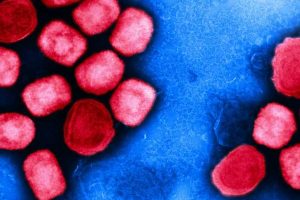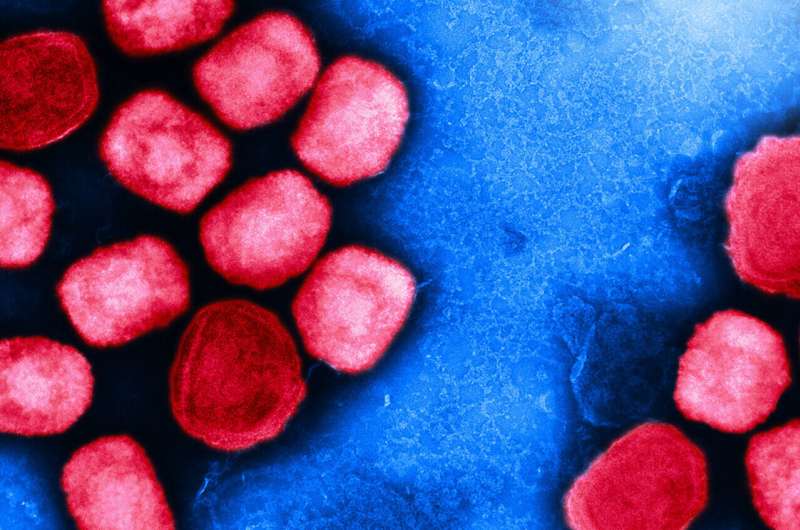Self-sampling proves effective in diagnosing asymptomatic mpox


An article published in Nature Communications on the pilot study carried out in Catalonia to evaluate the self-collection of biological samples reveals the high acceptability of the proposal and the key role of diagnosis in people without symptoms of mpox.
In July 2022, the World Health Organization (WHO) declared the mpox outbreak a Public Health Emergency of International Concern. Faced with a rising number of people affected by this zoonotic virus, the scientific community has initiated various studies aimed at curbing its spread among the population.
A pilot study led by researchers from the Centre for Epidemiological Studies on Sexually Transmitted Infections and AIDS of Catalonia (CEEISCAT), in collaboration with IrsiCaixa and the Department of Microbiology of the Clinical Laboratory of the Metropolitana Nord—Germans Trias i Pujol University Hospital (Can Ruti Campus), has been published in Nature Communications. The study demonstrates the importance of self-sampling in diagnosing asymptomatic or atypical cases of mpox.
The project, called Stop MPox, led by Dr. Cristina Agustí and Dr. Jordi Casabona of CEEISCAT, a research group of the Germans Trias i Pujol Research Institute (IGTP), evaluated a screening strategy for the virus causing mpox through self-collected biological samples among gay, bisexual, and other men who have sex with men, as well as transgender women who are potentially exposed to the virus. The community-based association Stop contributed to the fieldwork of this study carried out in Barcelona.
The intervention was designed in the context of the July 2022 outbreak of mpox-a disease usually transmitted through skin-to-skin contact during sexual activity-where Spain was the third most affected country outside the African continent. Diagnosis is a key factor for containing the spread of the virus, yet many cases went undetected due to a lack of symptoms or because these symptoms were not associated with the infection.
Therefore, the study aimed to assess the feasibility and acceptability of a community-based self-sampling strategy as a means to facilitate access to diagnosis and treatment for asymptomatic individuals or those with mild, unrecognized symptoms among the most at-risk exposed populations.
According to Cristina Agustí, the findings of Stop MPox prove that limiting testing solely to symptomatic individuals is insufficient for addressing potential outbreaks, as it excludes many others who could be infected and could transmit the virus.
“Our intervention has been able to isolate viruses with replicative and infectious capacities within the studied population. That is, even participants who were asymptomatic or had low viral loads had viable viruses capable of infecting others,” she clarifies. In fact, the scientific evidence and recommendations generated by the study are regaining relevance these days due to a new outbreak of mpox declared in Barcelona by the Public Health Agency.
With six confirmed cases between July and August of this year, the incidence is not expected to be as high as it was in the summer of 2022 (more than 2,000 cases registered until September 2022 in Catalonia), thanks primarily to the awareness campaigns and vaccination drives promoted by the Department of Health of the Government of Catalonia.
A total of 113 volunteers participated in the study, all of whom were recruited through the NGO Stop and took both anal and pharyngeal samples. Following laboratory analysis, all the participants were informed of their diagnosis. Those who tested positive were asked about the appearance of symptoms in the three weeks following their positive mpox result.
There were seven positive cases, all of whom were cisgender gay men; three reported being asymptomatic, and the other four had non-specific clinical presentations of the virus. “To confirm or rule out the positive cases, we conducted PCR tests based on the genetic material from the biological samples,” explains the study’s lead researcher from IrsiCaixa, Nuria Izquierdo-Useros.
“For the samples that tested positive, we applied a second test that analyzed the virus’s capacity to infect cells in culture. This infectious capacity reflects their potential to be transmissible to other people,” she adds.
The estimated prevalence of the infection from the study was 6.19%, and specifically, 7.87% among cisgender gay men. Likewise, participants were surveyed about their satisfaction with the self-sampling methodology, confirming a high degree of acceptance due to its ease and effectiveness.
The research team believes that the study’s findings could contribute to improving prevention and control policies for potential new outbreaks of this infection, suggesting the need to provide diagnostic tests to all individuals who are potentially exposed, regardless of their clinical symptoms.
More information:
Cristina Agustí et al, Self-sampling monkeypox virus testing in high-risk populations, asymptomatic or with unrecognized Mpox, in Spain, Nature Communications (2023). DOI: 10.1038/s41467-023-40490-9
Journal information:
Nature Communications
Source: Read Full Article